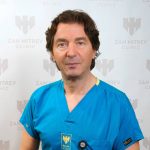 00389 2 3091 484
00389 2 3091 484
MEDICAL SERVICES
CARDIAC SURGERY
Cardiac surgeries
- Coronary bypass graft
- Valvular surgery (aortic, mitral, tricuspid and pulmonary valvular surgery)
- Surgical reconstruction of the left ventricle
- Removal of heart tumors
- Surgical treatment of congenital heart defects in adults and children
- Pericardial diseases surgery
- Combined surgery (bypass, valvulae, aorta)
- Surgical treatment of severe heart failure
- Implantation of a mechanical circulatory support in patients with chronic heart failure
- Surgical treatment in case of acute cardiogenic (placement on ECMO)
- Auto-transplantation
- Pericardial surgery
- Operation of ascending aorta (aortic aneurism and Stanford A dissection, aortic coarctation)
- Operation of the thoracic aorta (aneurism, dissection) and thoracoabdominal aneurism
- TAVI (transcutaneous aortic valve replacement)
- Mitral clip (percutaneous resolving of severe mitral insufficiency)
- Surgical replacement of pacemaker battery, removal of pacemaker wires
In the cardiac surgery department, all the patients receive an individualized treatment approach. This approach is a standard, implemented for years to all patients in our clinic. The individualized treatment approach aims to enable the patients to obtain a precise diagnosis followed by top surgery, appropriate treatment and postoperative monitoring.

Bypass surgery
Coronary bypass graft surgery
Over time, fats, cholesterol and other substances are deposited of arterial walls and form plaques. When a plaque is torn from the wall, a thrombus is formed, the blood flow through the heart is blocked and it can lead to discomfort in the chest (angina) and heart attack.
The coronary bypass surgery is a heart surgery. Blood vessels harvested from another part of the body are used for bypass in order to circumvent (bridge or bypass) the blocked or narrowed part of the coronary (heart) arteries. The bypass enables greater flow of oxygen through the heart muscle.
- A blood vessel from the patient’s thorax, hand or leg is harvested.
- One end of the blood vessel is attached to the aorta (the largest blood vessel which exits from the heart), and the other end is attached to the coronary artery under the point where it is blocked, and the new bypass enables optimal flow of the blood to the heart.
- It may be necessary to make several arterial bypasses depending on how many heart arteries are blocked.
- The surgery usually lasts for 3-6 hours.
The cardiac surgeries, including the coronary bypass surgery usually are performed using an extracorporeal circulation (patient’s blood flows through a special machine which enables temporary normal functioning of the patient’s organs and bloodless surgical field).
In certain situations, depending on the clinical condition of the patient and upon cardiac surgeon’s assessment, the coronary bypass surgery can be performed without using an extracorporeal circulation, also known as “off pump” coronary surgery, method which is safer for older patients and patients with comorbidities, but it is much more complex and requires exceptional surgical skills. This technique has been applied for many years in our clinic.

Surgerues of the thoracic part of the aorta
Surgeries of the ascending section of the aorta
- Aortic aneurism
- Stanford A dissection
- Aortic coarctation
Surgeries of the thoracic section of the aorta
- Aneurism
- Dissection
- Thoracoabdominal aneurism surgery
Valvular surgery
Heart valves surgery (aortic, mitral, tricuspid and pulmonary valves)
Valvular surgery or heart valve surgery is performed by replacement or reconstruction of the heart valve that does not “work” properly. Most of the valvular replacements involve aortic and mitral valves.
The aortic valve divides the left ventricle (the main pump of the heart) and the aorta (the largest arterial blood vessel which carries the blood in the entire body). The mitral valve divides the left atrium from the left ventricle. Four heart valves ensure the blood flow in the proper direction through the heart. In case or damage of the valves it may be necessary to reconstruct or replace the valve (with mechanical or biological prosthesis). The heart valve surgeries are made using extracorporeal circulation and usually last for 3-5 hours.
The most common valvular problems that lead to heart valve surgery are:
- Stenosis (the valves are not opening enough and do not enable sufficient blood flow).
- Insufficiency or regurgitation (they are not closing appropriately and lead to irregular flow).
- Prolapse – the mitral valve cusps do not close appropriately (usually in women).
- The problems that lead to heart valve surgery may be congenital or acquired during the lifetime.

Terminal stage heart failure surgery (mechanical circulatory support)
- Placement LVAD type mechanical circulatory support for chronic heart failure
- Placement RVAD type mechanical circulatory support for chronic heart failure
- Placing of a mechanical circulatory support in case of chronic heart failure of BVAD type
- Placing of a mechanical circulatory support in case of chronic heart failure of TAH – total artificial heart type
- Placing of a mechanical circulatory support in case of acute heart failure of ECMO, impella, centrimag, levitronix




